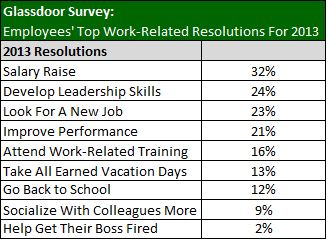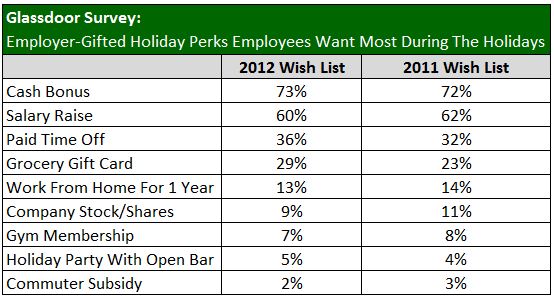When was the last time you actually kept a New Year’s resolution?
If you are anything like me, you probably go into the new year with all sorts of great intentions and plans for how you are going to change for the better. But life goes on, other things happen, and you find you’re lucky if you can even remember your New Year’s resolutions anytime after April 1.
That’s why this new survey from Glassdoor and conducted by Harris Interactive about employees work-related resolutions for 2013, although entertaining and fun, should be read with a bit of a skeptical eye.
The younger you are, the more you want a raise
According to Glassdoor, “One-third (32 percent) of employees said that a salary raise is their top work-related resolution for 2013, followed by looking for a new job (23 percent), improving their performance/rating by their supervisor (21 percent), attending work related training (16 percent), taking/using all their vacation days earned (13 percent), and socializing with work colleagues more (9 percent), among others.”
 Then, there was this bit of additional detail: “Younger employees are more focused on securing a salary raise in 2013, as 40 percent of 18-34 year olds say a raise is their top work-related resolution, compared to 33 percent of 35-44 year olds, 20 percent of 45-54 year olds, and 27 percent of 55+ year olds. While most employees favor a salary raise in 2013, employees 45-54 years old say their top resolution for 2013 is looking for a new job (24 percent). Also, 2 percent of employees said their top work-related resolution in 2013 is to help get their boss/supervisor fired.”
Then, there was this bit of additional detail: “Younger employees are more focused on securing a salary raise in 2013, as 40 percent of 18-34 year olds say a raise is their top work-related resolution, compared to 33 percent of 35-44 year olds, 20 percent of 45-54 year olds, and 27 percent of 55+ year olds. While most employees favor a salary raise in 2013, employees 45-54 years old say their top resolution for 2013 is looking for a new job (24 percent). Also, 2 percent of employees said their top work-related resolution in 2013 is to help get their boss/supervisor fired.”
Well, I fear for the 2 percent who want to help their boss/supervisor get fired, because that can be a pretty perilous business and more something you would see in Dilbert than actually happening in real life. On the rare occasions when I have seen somebody try this, it almost always ended with the employee, and not the boss, getting shown the door.
Here’s what Rusty Rueff, Glassdoor’s career and workplace expert who has led global HR departments at Electronic Arts and PepsiCo, had to say about the survey results:
As employment confidence gradually improves, it’s no surprise to see employees looking to wrest back control over their own destiny, which is why we see their focus on more money, a new job or a fresh commitment to their on-the-job performance. But good economy or tough economy, adequate and expected take home pay is always top of mind and employees are sending a clear message that they want this most – not only during this holiday season, but next year, too.”
What extra perks would employees prefer?
 The Glassdoor survey also asked employees about what extra perks they would most want to be given during the holidays. Again, the list isn’t all that surprising, because money and time off (predictably) top the list above.
The Glassdoor survey also asked employees about what extra perks they would most want to be given during the holidays. Again, the list isn’t all that surprising, because money and time off (predictably) top the list above.
The only thing that jumped out at me was that “holiday party with open bar” made the list of something employees might want. Now, I like a good party as much as anyone, but who asks for that rather than a bonus, raise, or more time off? Glassdoor’s Rusty Rueff puts this into perspective when he says:
When it comes to holiday perks, be sure to communicate and draw a line of sight to what made the perk possible. For example, are we partying tonight because the company achieved its annual goals? Did a specific department surpass projections? It’s essential to explain to employees what made a perk possible so they understand their hard work is appreciated and recognized, as well as providing history and context if next year isn’t as good.”
Yes, it is important that employees know what behavior helped them to get rewarded, but isn’t that the basis of a good rewards and recognition system, anyway?
Glassdoor’s 2012 survey was conducted online within the United States by Harris Interactive on behalf of Glassdoor from November 8-12, 2012 among 2,059 adults ages 18 and older, among whom 1,066 are employed full-time/part-time. This online survey is not based on a probability sample and therefore no estimate of theoretical sampling error can be calculated.
New Year’s resolutions are fun to make and talk about, but unless you have super human willpower, you probably have a hard time keeping them just as I do. When I read this survey of employee wishes and resolutions, what jumps out at me is less about the specifics of what workers are thinking about and more on what direction their thoughts are heading.
In other words, if you look at this another way, this survey tells you again that employees are largely dissatisfied — with their jobs, their pay, and where they are in their working life. No wonder so many employee engagement surveys come back with such bad results.
But that’s just my take. Your view may be a little different.
So again, take this list from Glassdoor with a grain of salt, because like most resolutions, these ones will probably be long gone and forgotten by the time February 2013 rolls around.
